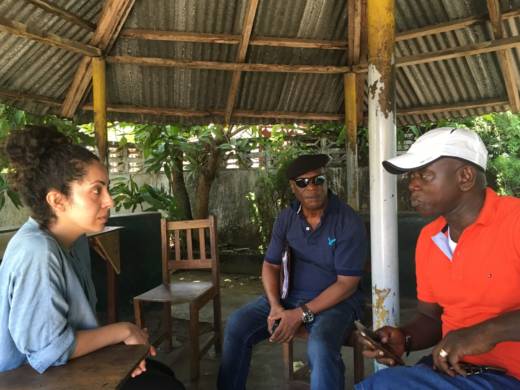Thomas, at the time, commanded a Liberian government military unit under then-President Samuel Doe.
More than three years after the center filed the suit on behalf of four survivors of the church massacre, a federal judge in Philadelphia ruled that Thomas is liable under U.S. law for participating in war crimes, crimes against humanity, extrajudicial killings and torture.
Word of the verdict brought some relief to the four plaintiffs, according to one of their lawyers, Nushin Sarkarati, a senior staff attorney at the CJA. But, she said, they are not giving up their decades-long battle to get justice.
"The victims aren't forgetting," Sarkarati said. "They lost their mothers, their children, their loved ones. It's very important for them that these perpetrators are held accountable for what they did to Liberia."
The four plaintiffs, who live in Liberia, remain anonymous due to fear of retaliation.
The ruling has reverberated among some members of the Bay Area's small Liberian community.
"The decision to hold Moses Thomas liable for crimes against humanity restores our hopes that justice delayed is not denied," said Lovetta Tugbeh, director of the Pleasant Hill-based Coalition for Justice in Liberia. Some of the group's members are survivors of the church massacre, she added.
"We are calling upon the government of Liberia to muster the courage to ensure justice will be served for war crimes," Tugbeh said
The church massacre took place during Liberia's first civil war, a seven-year conflict that started in 1989 and is believed to have led to the deaths of some 200,000 people by the time the fighting ended in 1997. Just two years later, in 1999, the country erupted into a second civil war that lasted until 2003.
Some of the plaintiffs in the lawsuit against Thomas say they witnessed their relatives killed during the church massacre and were forced to hide under dead bodies to survive. One was shot in the leg. Another was stabbed in the arm.
The case marks the first U.S. lawsuit aimed at holding a Liberian government forces commander responsible for serious violations of international law during the country's first civil war, according to the CJA.
When the lawsuit was originally filed in 2018, Thomas was living in suburban Philadelphia. A year later, he fled the U.S. and is believed to be back in Liberia.
Now that he's back home, some 30 years later, it's long past time for Liberia to bring justice to the survivors, Sarkarati said.
"They have a duty under international law to provide accountability," she said.
The CJA is pushing for Liberia to set up a special tribunal to adjudicate the church massacre incident and other civil war-era atrocities.

